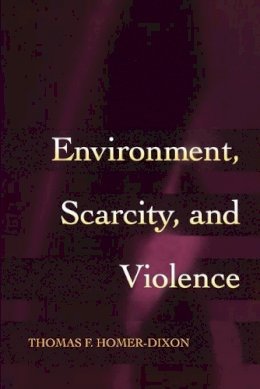
Stock image for illustration purposes only - book cover, edition or condition may vary.
Environment, Scarcity, and Violence
Thomas F. Homer-Dixon
€ 73.46
FREE Delivery in Ireland
Description for Environment, Scarcity, and Violence
Paperback. Argues that the environmental scarcities will have profound social consequences - contributing to insurrections, ethnic clashes, urban unrest, and other forms of civil violence. This book develops a model of the sources of environmental scarcity. It shows that scarcities stem from the degradation and depletion of renewable resources. Num Pages: 272 pages, 17 line illus., 6 tables. BIC Classification: JFFE; JFFR; JPA; RNT. Category: (P) Professional & Vocational; (U) Tertiary Education (US: College). Dimension: 157 x 235 x 17. Weight in Grams: 398.
The Earth's human population is expected to pass eight billion by the year 2025, while rapid growth in the global economy will spur ever increasing demands for natural resources. The world will consequently face growing scarcities of such vital renewable resources as cropland, fresh water, and forests. Thomas Homer-Dixon argues in this sobering book that these environmental scarcities will have profound social consequences--contributing to insurrections, ethnic clashes, urban unrest, and other forms of civil violence, especially in the developing world. Homer-Dixon synthesizes work from a wide range of international research projects to develop a detailed model of the sources of environmental scarcity. He refers to water shortages in China, population growth in sub-Saharan Africa, and land distribution in Mexico, for example, to show that scarcities stem from the degradation and depletion of renewable resources, the increased demand for these resources, and/or their unequal distribution. He shows that these scarcities can lead to deepened poverty, large-scale migrations, sharpened social cleavages, and weakened institutions. And he describes the kinds of violence that can result from these social effects, arguing that conflicts in Chiapas, Mexico and ongoing turmoil in many African and Asian countries, for instance, are already partly a consequence of scarcity. Homer-Dixon is careful to point out that the effects of environmental scarcity are indirect and act in combination with other social, political, and economic stresses. He also acknowledges that human ingenuity can reduce the likelihood of conflict, particularly in countries with efficient markets, capable states, and an educated populace. But he argues that the violent consequences of scarcity should not be underestimated--especially when about half the world's population depends directly on local renewables for their day-to-day well-being. In the next decades, he writes, growing scarcities will affect billions of people with unprecedented severity and at an unparalleled scale and pace. Clearly written and forcefully argued, this book will become the standard work on the complex relationship between environmental scarcities and human violence.
Product Details
Publisher
Princeton University Press United States
Number of pages
272
Format
Paperback
Publication date
2001
Condition
New
Weight
398g
Number of Pages
272
Place of Publication
New Jersey, United States
ISBN
9780691089799
SKU
V9780691089799
Shipping Time
Usually ships in 7 to 11 working days
Ref
99-1
About Thomas F. Homer-Dixon
Thomas F. Homer-Dixon is Associate Professor of Political Science and Director of the Peace and Conflict Studies Program at the University of Toronto. He is the author of Environmental Scarcity and Global Secunty and The Ingenuity Gop.
Reviews for Environment, Scarcity, and Violence
Winner of the 2000 Lynton Keith Caldwell Prize, American Political Science Association "[The book's] assertion that violence and the environment may be linked, and its conclusion that most big developing countries appear to be hurtling toward more internal conflict, are too important and intriguing to be left to an academic audience."
John Stackhouse, Toronto Globe and Mail "This volume is for anyone with professional or deep personal interests in the relationships of natural resource management to economic development and human societies."
Joseph P. Dudley, The Quarterly Review of Biology "[A] comprehensible model linking environmental scarcity and violence."
Stephen P. Adamian, Boston Book Review "Important and intriguing."
John Stackhouse, Globe and Mail "Clearly written and forcefully argued, Environment, Scarcity, and Violence is an excellent work."
Biology Digest "Thomas Homer-Dixon ... has conducted extensive research on the links between environmental stress and violence in developing countries... The book addresses the fact that environmental scarcity is not in itself a necessary or sufficient cause of conflict. Homer-Dixon evaluates why some societies are able to adapt well to environmental scarcity while others are not."
Nikola Smith, Journal of International Affairs
John Stackhouse, Toronto Globe and Mail "This volume is for anyone with professional or deep personal interests in the relationships of natural resource management to economic development and human societies."
Joseph P. Dudley, The Quarterly Review of Biology "[A] comprehensible model linking environmental scarcity and violence."
Stephen P. Adamian, Boston Book Review "Important and intriguing."
John Stackhouse, Globe and Mail "Clearly written and forcefully argued, Environment, Scarcity, and Violence is an excellent work."
Biology Digest "Thomas Homer-Dixon ... has conducted extensive research on the links between environmental stress and violence in developing countries... The book addresses the fact that environmental scarcity is not in itself a necessary or sufficient cause of conflict. Homer-Dixon evaluates why some societies are able to adapt well to environmental scarcity while others are not."
Nikola Smith, Journal of International Affairs
